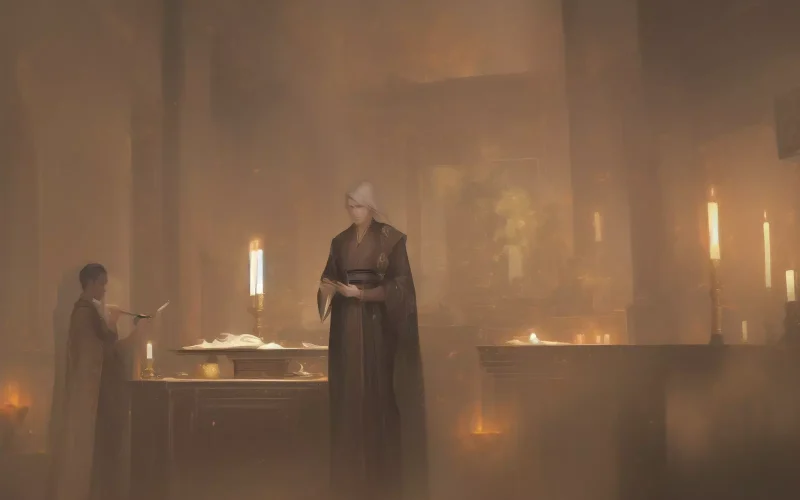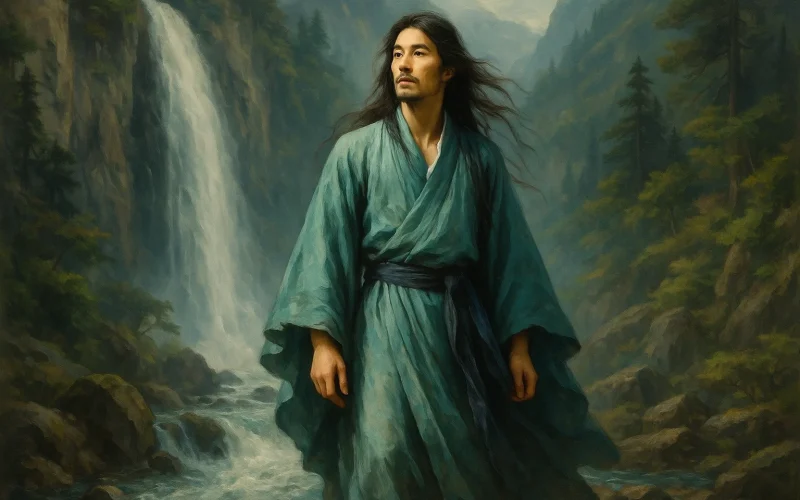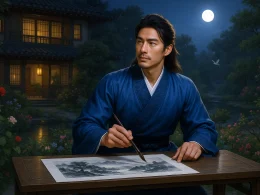Zhang Jiuling(张九龄 673-740 A.D.), a native of Qujiang, Shaozhou (now Shaoguan City, Guangdong Province). He was a famous minister, politician, literary scholar and poet of the Tang Dynasty. known as "the first man of Lingnan", was born in a family of officials in Qujiang, Shaozhou, and his ancestors had been local officials in Lingnan for three generations.
At that time, he wrote a letter to Wang Fangqing, the governor of Guangzhou, who praised him after reading it and kept telling people around him that this young man would have great success in the future!
Soon after, Zhang Jiuling took the imperial examination in the second year of Wu Zetian's Chang'an reign, and was admitted to the imperial examinations in one fell swoop. He was awarded the official position of schoolmaster (local librarian), and was admired by Shen Nephew.
In the third year of Chang'an, the chancellor Zhang said that he was sent to Lingnan because he had offended his favorite minister Zhang Changzong, and when he passed through Shaozhou, he saw Zhang Jiuling's essays and praised him for his essays, which were "as light and thick as practice" and could "help the times". Zhang Jiuling, a thousand-lipped horse, finally met the bole in his life. Zhang Jiu-ling's talent was confirmed by the fact that he was a learned man who had been an important minister in the imperial court and was one of the leading literati of his time.
In the third year of Shen Long, Zhang Jiuling rushed to Chang'an to take the examination of the Ministry of Officials and was awarded the title of national librarian (secretary province schoolmaster), becoming a Beijing official. The position of schoolmaster was very high in the Tang Dynasty, because those who could get this post were all from the imperial examinations and were treated as national reserve talents with great future.
However, Zhang Jiuling had been a schoolmaster for several years and had not been promoted, so he was discouraged and thought of resigning to go back to Lingnan.
Not long after, Li Longji became the emperor, and he immediately promoted Zhang Jiuling to the position of left collector. Zhang Jiuling quickly adapted to the post, and he was particularly active, often writing to express his ideas. However, Zhang Jiuling's admonition time and again, and finally even more so for pointing out the problems of Yao Chong's local officials, made the chancellor Yao Chong very unhappy. After offending the chancellor, Zhang Jiuling's life in the court was naturally not easy. Soon, Zhang Jiuling himself also felt no point, so he resigned from his official position and returned to Lingnan on the grounds that his term of office had expired.
During his two years back to his hometown in Lingnan, Zhang Jiuling, besides drinking wine and writing poems with his good friends Wang Cuzhen, the county lieutenant of Qujiang, and Wang Sima, the secretary of Shaozhou, he also did a great thing for the benefit of the country and the people, which was the construction of Dayu Ling Road.
At this time, the Tang Dynasty, after several generations of efforts, was economically developed and socially stable. The Lingnan area was close to the sea and the sea trade was well developed, and Guangzhou became the most prosperous port at that time, but the north-south traffic was very inconvenient. Zhang Jiuling, who was dedicated to the people and full of enthusiasm, gave a report to the central government "on the importance and feasibility of Dayu Ling Road", and at this time the wealthy court took a look at the proposal, which was good, and agreed with a stroke of a pen.
So Zhang Jiuling appointed himself as the chief planner of the project and the general manager of the project, and took advantage of the free time of the farmers to recruit migrant workers to start the work. He himself did not resign himself to hard work, personally at the front line, the overall design, construction, into the feverish road repair industry. After the completion of the road, which was called the "ancient Beijing-Guangzhou line", it was more than ten kilometers long and nearly 17 meters wide, with pine trees planted on both sides of the road, which made the north-south traffic very convenient and promoted the exchange between the Lingnan area and the Central Plains, and also benefited future generations.
In the sixth year of Kaiyuan, Zhang Jiuling was called back to Chang'an because of his merits in road construction, and was in charge of the cadre selection work of the organization department. In this position, Zhang Jiuling's talent and ability were gradually recognized by the officials in the court, and the four cadre selections he participated in were all done very justly and fairly, and everyone was convinced. In this way, Zhang Jiuling rose through the ranks and took up the posts of minister of the Ministry of Rites and minister of the Secretary of Xun.
In the ninth year of Kaiyuan, Zhang Jiuling's advisor, Zhang Say, was transferred back to the post of chancellor by the court. Zhang Jiu-ling was already admired by Zhang said, for this junior with the same surname, he always looked for opportunities to promote him. But Zhang Jiuling is very personal, adhere to their own principles, and not because Zhang said to promote him and Zhang said, the advice on the advice, is a clear stream of ministers in the court.
Soon, the chancellor Zhang said offended Yu Wenrong and Li Linfu and other people, in these people impeachment, Zhang said again was removed from the minister. Zhang Jiuling was also implicated, and he was exiled and served as the governor of Jizhou, the governor of Hongzhou, and the governor of Guizhou.
In the seventeenth year of Kaiyuan, Zhang said he was appointed as the left minister of Shang Shu and the bachelor of Ji Xian Yuan Yuan, but the next year he fell ill and recommended Zhang Jiuling to Emperor Xuanzong many times before his death. So Zhang Jiuling was recalled to Chang'an as an official by Emperor Xuanzong of Tang, who asked him to be his secretary, responsible for writing edicts. This is Zhang Jiuling's strength, he wrote the imperial edict without a draft, and the waving of the pen, Tang Xuanzong used it very smoothly.
But at this time Zhang Jiuling was already 55 years old, he wanted to retire on the grounds that he was going home to take care of his mother, but how could Tang Emperor Xuanzong let go of this talent, he made Zhang Jiuling's two younger brothers as big officials in Lingnan to take care of his mother nearby.
In the twenty-first year of Kaiyuan, Zhang Jiuling was promoted by Emperor Tang Xuanzong and finally became the prime minister and presided over the imperial government. Zhang Jiuling was the last of the wise ministers in the heyday of the Kaiyuan era, as he was outspoken and daring, impartial and law-abiding, and unafraid of the powerful. Although the Tang Dynasty was in its heyday during this period, there were various social crises lurking. In response to these hidden dangers, Zhang Jiuling advised Emperor Xuanzong of Tang to love the people and not to be greedy for border merits; he advocated to save penalties and lightly impose taxes; and to improve the rule of officials. The series of policies he implemented greatly alleviated the social conflicts and maintained the good situation of the Kaiyuan period.
When Zhang Jiuling was the chancellor, An Lushan, the deputy of Zhang Shougui, the Fangyang provincial governor, failed in his crusade against Xi and Khitan because he was reckless, and was sent to Chang'an for trial. Zhang Jiuling was so sharp that he saw that An Lushan was a treacherous man and thought that he would definitely commit crimes in the future, so he submitted a petition to Emperor Xuanzong of Tang, hoping that An Lushan would be executed according to military law. The Emperor then released An Lushan as a sign of his imperial grace, laying the groundwork for the An Shi Rebellion.
Zhang Jiuling was jealous of Li Linfu, who was uneducated and wanted to rise to the throne, because he only interacted with those who had talent and integrity in the court, and his character was appreciated by the emperor. In the late Kaiyuan period, Tang Emperor Xuanzong became complacent, became extravagant, and became close to Li Linfu and others, but gradually distanced himself from Zhang Jiuling, who was outspoken and dared to advise. Despite Zhang Jiuling's loyalty, in the end, he could not escape the fate of the villain's ostracism.
First, when Tang Emperor Xuanzong wanted to make Zhang Shougui, the minister of Fangyang Festival, a minister, Zhang Jiuling tried to stop it and Tang Emperor Xuanzong was not happy. Then, when Niu Xianke, the then hexi sectional governor, had outstanding achievements, Tang Xuanzong wanted to promote him to be the minister of six ministries. Zhang Jiuling thought that Niu Xianke was not suitable for this position because of his low origin and lack of experience in central work. The Tang Emperor wanted to give Niu Xianke an additional title, but Zhang Jiuling opposed it, and Li Linfu kept offering slanderous words to slander Zhang Jiuling.
After Zhang Jiuling was dismissed from the post of prime minister, Zhang Jiuling was relegated to the post of governor of Jingzhou because his previous recommendation, Zhou Zilang, had impeached Niu Xianke for his ridiculous words, which angered Emperor Tang Xuanzong, who blamed Zhang Jiuling for his wrong recommendation.
After Zhang Jiuling was deported to Jingzhou, he was filled with sorrow and anger, and every time he read Han Fei's "Solitary Anger", he sobbed.
In the twenty-eighth year of Kaiyuan, Zhang Jiuling died in Jingzhou at the age of sixty-eight, and Emperor Xuanzong of Tang Dynasty posthumously made him the Grand Viceroy of Jingzhou.
Zhang Jiuling was the only chancellor of the Tang Dynasty who was born from a scholar in Lingnan, he was gentle, elegant and graceful, and was praised by people at that time as the "Qujiang style". After Zhang Jiuling's death, whenever someone recommended a candidate for the post of prime minister, Tang Emperor Xuanzong would always say, "Does he have the same poise as Jiuling?"
After Zhang Jiuling's death, the Tang Dynasty began to decline from its heyday, which is saddening!















